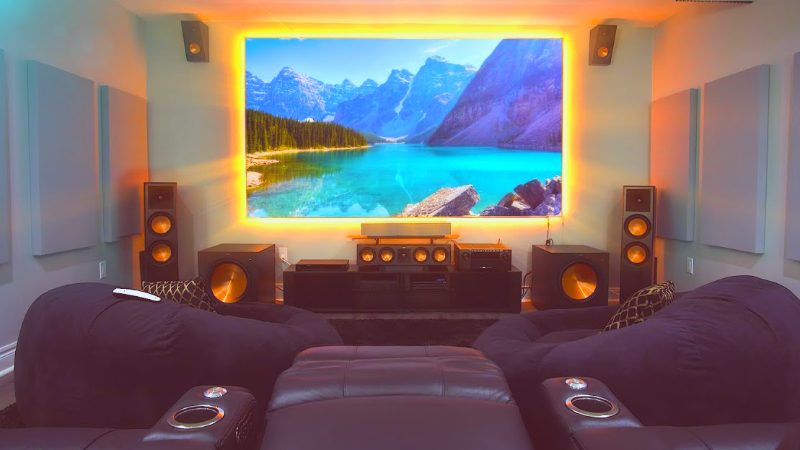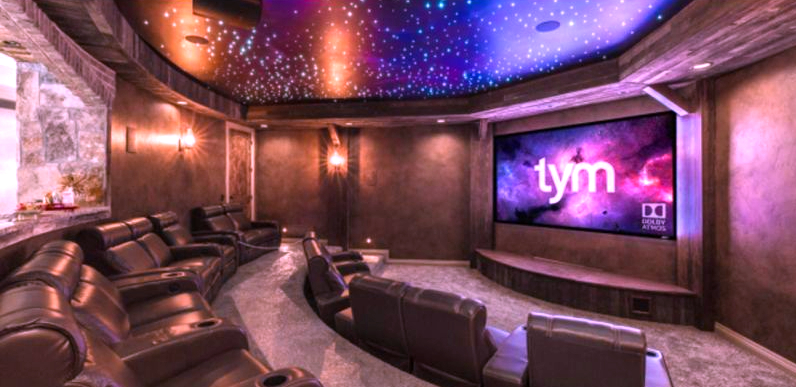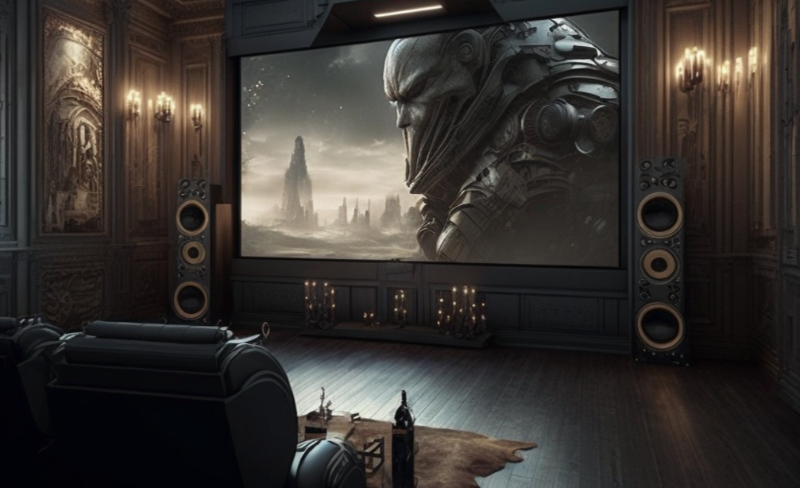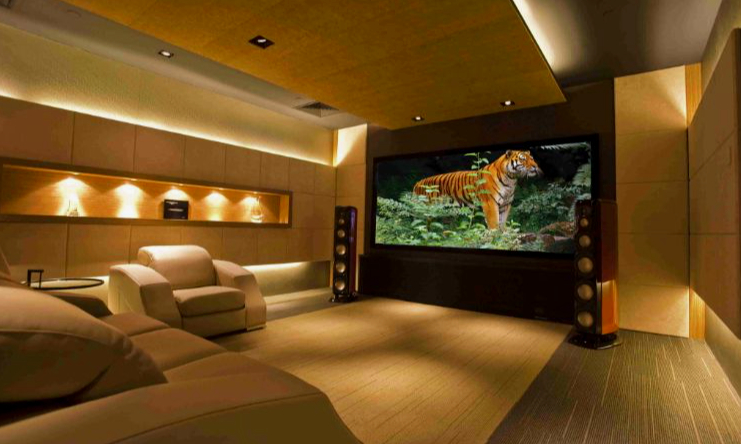Home theaters have come a long way since their inception in the early 20th century. From humble beginnings as a way to bring the movie theater experience into the home, home theaters have evolved into sophisticated entertainment systems that can rival even the most advanced commercial theaters. Whether you’re looking for a luxury home theater setup or an affordable option, there are a few key considerations you should keep in mind when shopping for your home theater.
A Brief History of Home Theaters

The first home theaters were simply a way for people to bring the movie theater experience into their own homes. In the 1920s and 1930s, home movie projectors and screens became available, allowing people to watch films in the comfort of their living rooms. However, it wasn’t until the 1950s and 1960s that home theaters began to take on a more sophisticated form. With the advent of color television and stereo sound systems, home theaters started to resemble the commercial theaters of the time.
In the 1980s and 1990s, home theaters became even more advanced, with the introduction of large-screen televisions and surround sound systems. This was also the era of the VHS and later, the DVD, which allowed people to watch movies and TV shows at home with higher-quality video and audio.
Today, home theaters have reached a new level of sophistication, with high-definition displays, advanced surround sound systems, and even 3D capabilities. No longer just a way to watch movies, home theaters have become an all-encompassing entertainment experience, with options for streaming movies and TV shows, playing video games, and even hosting sporting events and concerts.
Purchasing Considerations

When shopping for a home theater, there are a few key considerations to keep in mind:
- Budget: The cost of a home theater can range from a few hundred dollars to tens of thousands of dollars, depending on the size and complexity of the setup. Determine your budget before you start shopping to help narrow down your options.
- Room size: Consider the size of the room where you’ll be setting up your home theater. Larger rooms will require a bigger screen and more powerful speakers, while smaller rooms may be able to get away with a smaller setup.
- Audio and video quality: The quality of the audio and video is important for the overall enjoyment of your home theater experience. Look for high-definition displays and surround sound systems with good reviews.
- Features: Do you want a home theater that can stream movies and TV shows, play video games, or host sporting events and concerts? Consider the features that are most important to you when shopping for your home theater.
Luxury Home Theater Options

For those looking for the ultimate home theater experience, there are a few luxury options to consider:
- Custom-built theaters: If you have the budget and the space, you can have a custom-built home theater designed and installed. This will allow you to create the perfect home theater setup tailored to your specific needs and preferences.
- High-end audio and video equipment: To get the best audio and video quality, you’ll want to invest in high-end equipment. This can include a 4K or 8K display, Dolby Atmos surround sound system, and high-quality speakers and amplifiers.
- Luxury seating: Upgrade your home theater experience with comfortable, high-end seating. Options include recliners with built-in cup holders and even theater-style seating with footrests and armrests.
- Advanced control systems: A home automation system can allow you to control all aspects of your home theater with the touch of a button, from adjusting the lighting and temperature to selecting what you want to watch. This can make your home theater experience more convenient and immersive.
Affordable Home Theater Options

If you don’t have the budget for a luxury home theater setup, there are still plenty of affordable options available. Here are a few ideas:
- Streaming devices: If you already have a TV, you can turn it into a home theater by adding a streaming device like a Roku or Amazon Fire Stick. These devices allow you to stream movies and TV shows from popular platforms like Netflix, Hulu, and Amazon Prime.
- Soundbars: A soundbar is a compact audio system that can be placed under or above your TV. It’s a good option if you don’t have room for a full surround sound system, and many soundbars come with Bluetooth connectivity for streaming music from your phone or tablet.
- Projectors: While not as high-definition as a modern TV, a projector can still provide a good home theater experience at a lower cost. Look for a projector with a high lumens rating for a brighter, clearer image.
- Used equipment: You can often find used home theater equipment for sale at a fraction of the cost of new gear. Just be sure to do your research and make sure the equipment is in good working order before making a purchase.
Overall, there are plenty of options available for both luxury and affordable home theaters. Consider your budget, room size, and desired features when shopping for your home theater setup, and you’ll be on your way to enjoying movies and TV shows in the comfort of your own home.
In addition to the above considerations, there are a few other factors to keep in mind when shopping for a home theater.
- Compatibility: Ensure the equipment you’re considering is compatible with your other devices and systems. This includes things like the type of TV or projector you have, as well as the type of cables and connectors you’ll need.
- Ease of use: A home theater should be easy to set up and use, so consider the simplicity of the setup and any additional features that might make your home theater experience more enjoyable. This can include voice control, app control, and automatic calibration of audio and video settings.
- Brand reputation: Do some research on the brands you’re considering, and look for reviews and ratings from other customers. This can help you get a sense of the reliability and performance of different home theater systems.
- Warranty: Make sure the equipment you’re considering comes with a good warranty, in case any issues arise down the line.
By keeping these additional factors in mind, you’ll be better equipped to find the right home theater setup for your needs and budget. Whether you’re looking for a luxury home theater or an affordable option, there are plenty of choices available to bring the movie theater experience into your own home.
Another important aspect of home theaters is the design and layout of the room. While the quality of the audio and video equipment is certainly important, the overall feel and aesthetic of the room can also greatly affect your home theater experience. Here are a few design tips to consider:
- Seating arrangement: The seating arrangement in your home theater should be comfortable and allow for an unobstructed view of the screen. Consider the size of the room and the size of your screen when deciding on the number and placement of seats.
- Lighting: Proper lighting is important for both the enjoyment of the movie and the safety of your guests. Consider adding dimmer switches or using theater-style sconces to control the lighting in the room.
- Acoustics: The acoustics of the room can greatly affect the quality of the audio in your home theater. Consider adding sound-absorbing materials to the walls and ceiling to reduce echo and improve the overall sound quality.
- Decor: Add some personal touches to your home theater with decor that reflects your style and interests. This can include movie posters, throw pillows, and other decorative elements.
By keeping these design tips in mind, you can create a home theater that is not only functional but also a welcoming and enjoyable space for you and your guests.
In conclusion, home theaters have come a long way since their inception in the early 20th century. Whether you’re looking for a luxury setup or an affordable option, there are a few key considerations to keep in mind when shopping for your home theater, including a budget, room size, audio, and video quality, and features.
Additionally, consider the design and layout of the room, as well as the compatibility, ease of use, brand reputation, and warranty of the equipment you’re considering. With these factors in mind, you’ll be well on your way to creating the ultimate home theater experience.
